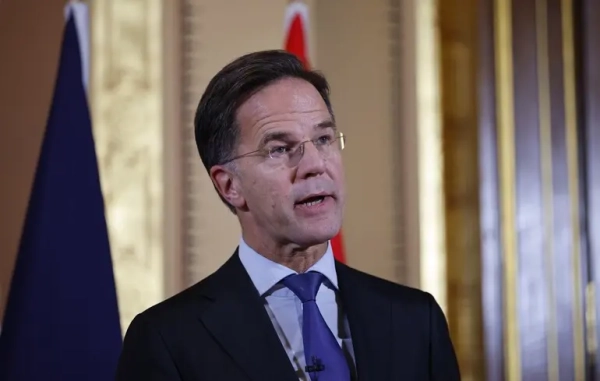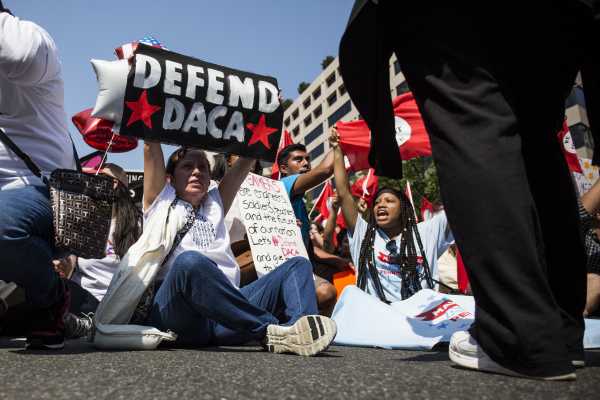
Most millennials — whether or not they voted for Donald Trump or how they identify racially — generally support immigration reforms that offer a path to citizenship for some immigrants in the US. However, a new survey by the University of Chicago’s GenForward Project shows the nuanced and conflicting beliefs this generation has about how the policy to do so should work.
The group’s January report, using data collected between October 26 and November 10, 2017, offers a look into how 1,800 millennials ages 18 to 34 think about American identity, what makes someone a citizen, and US immigration policy. The survey finds that while more than 75 percent of millennials of all races support a pathway to citizenship for DACA-eligible individuals, there are considerable divides in how some racial groups perceive other immigration issues and in how they evaluate President Trump’s performance on immigration policy.
The survey results suggest that the current framing of the immigration debate fails to capture the range of attitudes that actually exist, and that those attitudes themselves could shift with more awareness of specific immigration-related issues.
President Trump has long made immigration a focal point of his administration’s political agenda, promising to curb undocumented immigration into the country, build a wall on the US-Mexico border, and drastically reduce the number of immigrants capable of entering the country legally.
But in recent months, the immigration debate has largely circled around the fate of the Deferred Action for Childhood Arrivals program, which the president moved to end last fall (Trump gave the program a six-month sunset period, meaning that it will officially end in March). In the time since, some DACA recipients — known as DREAMers — have already begun to lose the legal protections and work benefits that have protected them from deportation since 2012.
Related
9 facts that explain DACA, the immigration program Trump is ending
Thousands of immigrants are losing their DACA protections already
Given the tremendous state of upheaval that many immigrant communities have been thrown into and the fact that 63 percent of millennials disapprove of how Trump is running the country in general according to a January NBC/GenForward poll, it is perhaps unsurprising that the majority of those polled disapprove of how the president has handled immigration issues. Overall, the January GenForward report notes that “approximately 43% of whites, compared to fewer than 25% African American, Latinx and Asian American Millennials, approve of how President Trump has handled immigration.”
Looking at the approval ratings by race, the survey finds that just 8 percent of African Americans, 14 percent of Latinos, and 21 percent of Asian Americans support how Trump has handled immigration. While white millennials also largely disapprove of his handling of the issue, with only 43 percent expressing support (and higher percentages supporting policies he has advocated, like increased funding for border security), the 43 percent versus 56 percent approval-disapproval gap among white millennials is far smaller than the gap seen in other racial groups.
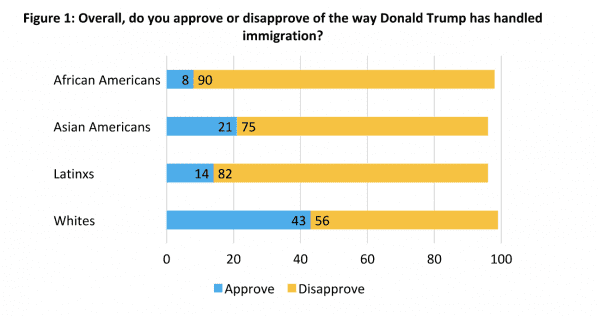

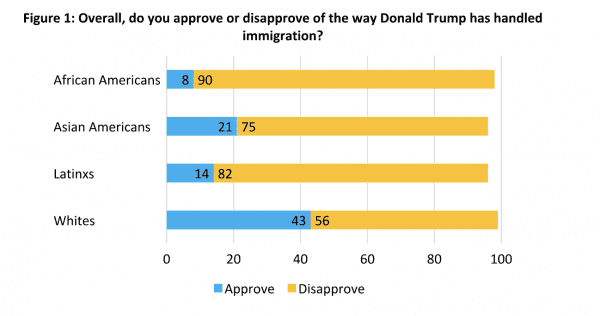
The survey also finds that those who reported voting for Trump in 2016 express a range of attitudes on immigration and are not entirely closed off to the legalization of DREAMers and other groups of immigrants. For example, while majorities of Trump-backing millennials are supportive of restrictive immigration policies like the construction of a border wall (backed by 75 percent of millennial Trump voters) and the deportation of all undocumented immigrants (backed by 64 percent of this group), they are also largely supportive, albeit at varying levels, of providing a pathway to citizenship to those eligible for DACA (supported by 66 percent), “law-abiding” immigrants (supported by 76 percent), and those who have served in the military and are honorably discharged (supported by 83 percent). Similar polls of Trump voters in general have also found that there is significant support for granting legal status to DREAMers.
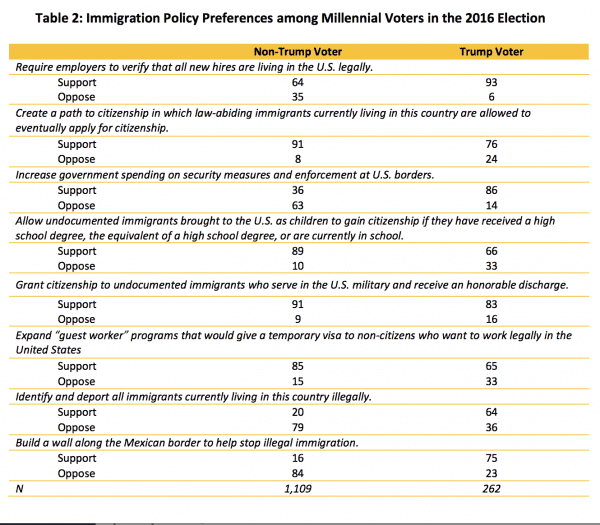

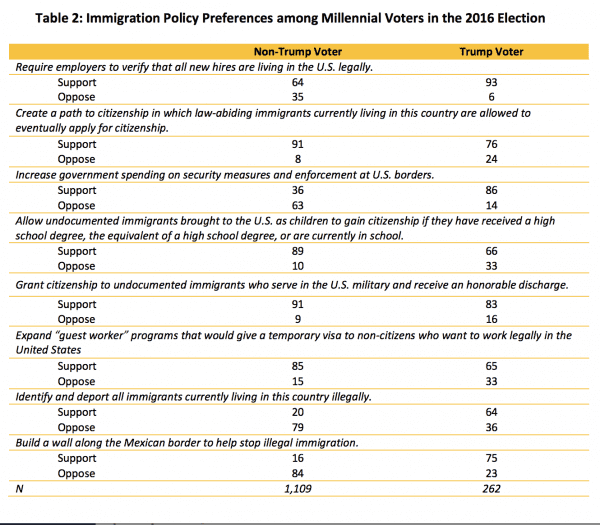
“Overwhelmingly, most millennials say that they support more liberal immigration policies,” Cathy Cohen, a political science professor at the University of Chicago and the lead researcher on the GenForward survey, tells Vox. “These same voters, though, particularly white millennials, at times offer agreement to what can be seen as restrictive immigration laws.”
A large number of millennials see immigration as an issue that affects them personally
There could be several possible reasons why white millennials in particular report higher levels of support for some immigration restrictions than other groups. One key reason the GenForward research highlights is the fact that white millennials are less likely than other groups to have close relationships — friends, family, or otherwise — with someone who recently immigrated to the US.
For example, while 49 percent of Latino millennials in the survey reported having concerns that they, a close friend, or a family member could be deported, just 10 percent of their white peers said the same (25 percent of Asian Americans and 21 percent of African Americans also expressed concerns about deportation of themselves or a loved one). It’s also worth noting that by and large, the majority of those who are DACA-eligible fall into the millennial generation.
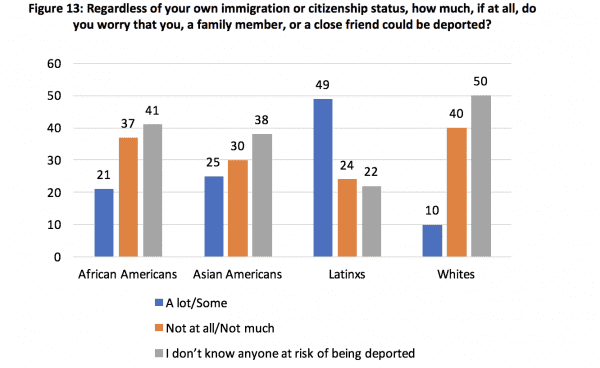

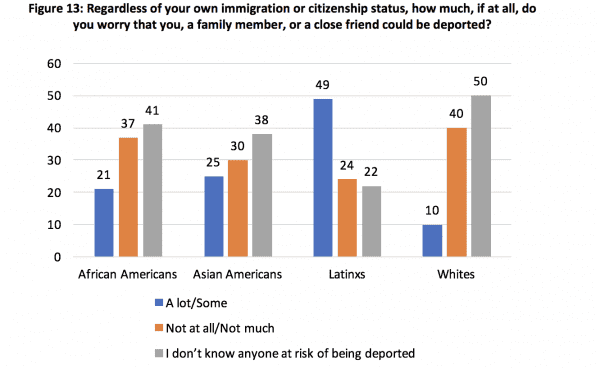
“Immigration increasingly shapes who is part of the Millennial generation in the US,” the survey researchers note. “Approximately 20% of Millennials are children of immigrants and, according to recent estimates, over half of newly arrived immigrant workers are Millennials. Given Millennials’ relationship with immigration, it is important to interrogate and center their perspectives in the current immigration debate.”
Millennial attitudes on immigration aren’t always clear-cut — and can vary significantly between racial groups
While millennials broadly support immigration, falling largely in support of DACA and other proposals that have been framed as more liberal, there is some difference in how varying groups view specific proposals. Generally, the report highlights that white millennials are the most likely to support restrictive immigration policies, expressing the strongest support for the construction of a border wall and the deportation of undocumented immigrants. But the report finds that other groups express some support for restrictive measures as well.
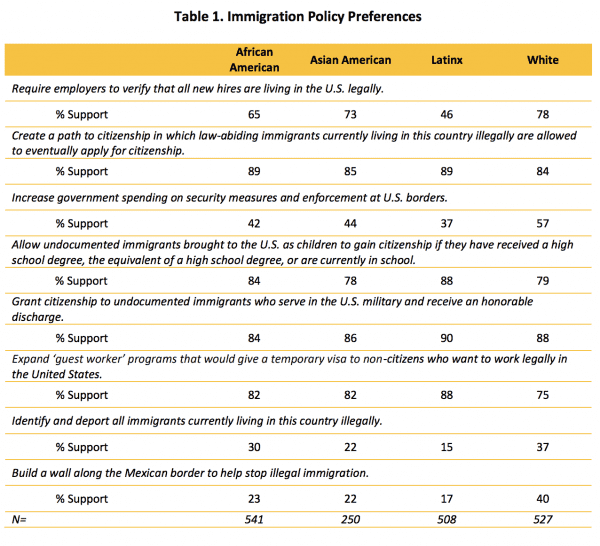

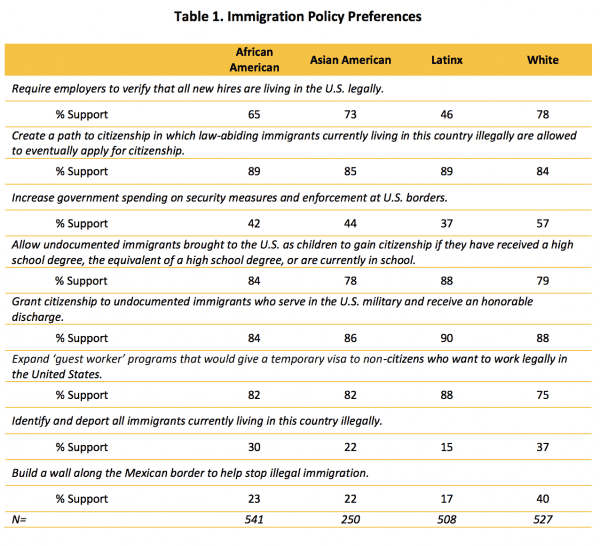
The researchers note:
The researchers did not pin down an exact cause for what could be behind the variation in beliefs among the different millennial groups, although it does highlight that some of the results, particularly the difference in some groups’ support for a pathway to citizenship versus deporting all immigrants, might suggest “a lack of understanding or coherent ideology when it comes to immigration policy among those less directly impacted by such policies.”
If a lack of understanding of immigration issues is to blame, that points to an interesting — and concerning — conundrum, suggesting that the current immigration debate is both confusing and far too polarized to capture the beliefs of some members of the American public.
Cohen, the GenForward researcher, says it’s a confusion that might be exacerbated by the White House, which has offered a range of immigration proposals, some of which have fluctuated wildly in their demands. “I think [the survey reflects] the same sort of confusion we are seeing with the president,” she says. “People are responding to multiple narratives. They believe people that are law-abiding should be given a pathway [to citizenship]. There’s also a narrative that says that we’re in danger and we need greater security, and you see in particular white millennials also responding to that narrative.”
The GenForward survey did not ask respondents about more complicated immigration issues that have seen attention recently, like the Trump administration’s backing of measures that would curb legal immigration, the president’s recurring disparagement of the diversity visa lottery, or his moves to end humanitarian programs like Temporary Protected Status. Due to when responses were recorded, the survey also did not ask about Trump’s more recent statements reportedly deriding predominantly black countries in Africa as “shitholes.”
Cohen says that while many of these topics simply couldn’t be included because they became topics of discussion after the survey was conducted, they also require a more detailed understanding of US immigration policy that the general public might not have. “One of the reasons to ask about DACA or the wall or security at the border [is] that these have been the targets of discourse around immigration,” she says. “People have an idea of what they are talking about.”
Cohen also argues that even as the immigration debate, particularly over DREAMers, has intensified this month due to Democrats shutting down the government to force action on DACA, there is still value in examining what these attitudes looked like a few months ago. “What we have by looking at the data in October and November is a more stable lens into how millennials were thinking about immigrants and how I think they’ll come back to looking at immigration when all of the provocative activity gets removed,” she adds.
The findings also suggest that conversations about what immigration in the US should look like get much more nuanced when looking beyond DREAMers, who in recent months have seen an outpouring of support. And at a time when the White House is backing a plan that pits legalizing the status of DREAMers against the fate of future immigrants to the United States, it also suggests that attitudes toward the US immigration system as a whole are still somewhat obscured.
Related
“I want more than anything to just live my life”: DREAMers wrestle with being used as “hostages” in immigration debate
Ultimately, the researchers suggest that changing how immigration issues are discussed is necessary to better inform the conversation. “What we need is greater political education, greater discussion about immigration, so that people can clarify their position on the issue,” Cohen says.
Sourse: vox.com


